Analyzing Accounting Concepts, Conventions, and Their Financial Impact
VerifiedAdded on 2023/06/18
|11
|3282
|151
Essay
AI Summary
This essay provides an in-depth analysis of financial accounting, focusing on the history of accounting regulations and the critical role of accounting concepts and conventions in shaping an organization's financial statements. It elucidates fundamental accounting concepts such as the business entity concept, money measurement concept, going concern concept, and dual aspect concept, detailing their impact on financial reporting. Furthermore, it explores accounting conventions including consistency, materiality, and conservation, explaining how these conventions ensure uniformity, relevance, and prudence in financial accounting practices. The essay highlights the significance of these concepts and conventions in providing reliable, understandable, and comparable financial information to stakeholders, while also acknowledging their limitations, such as the inability to capture non-monetary aspects and the potential for misleading information during liquidation.
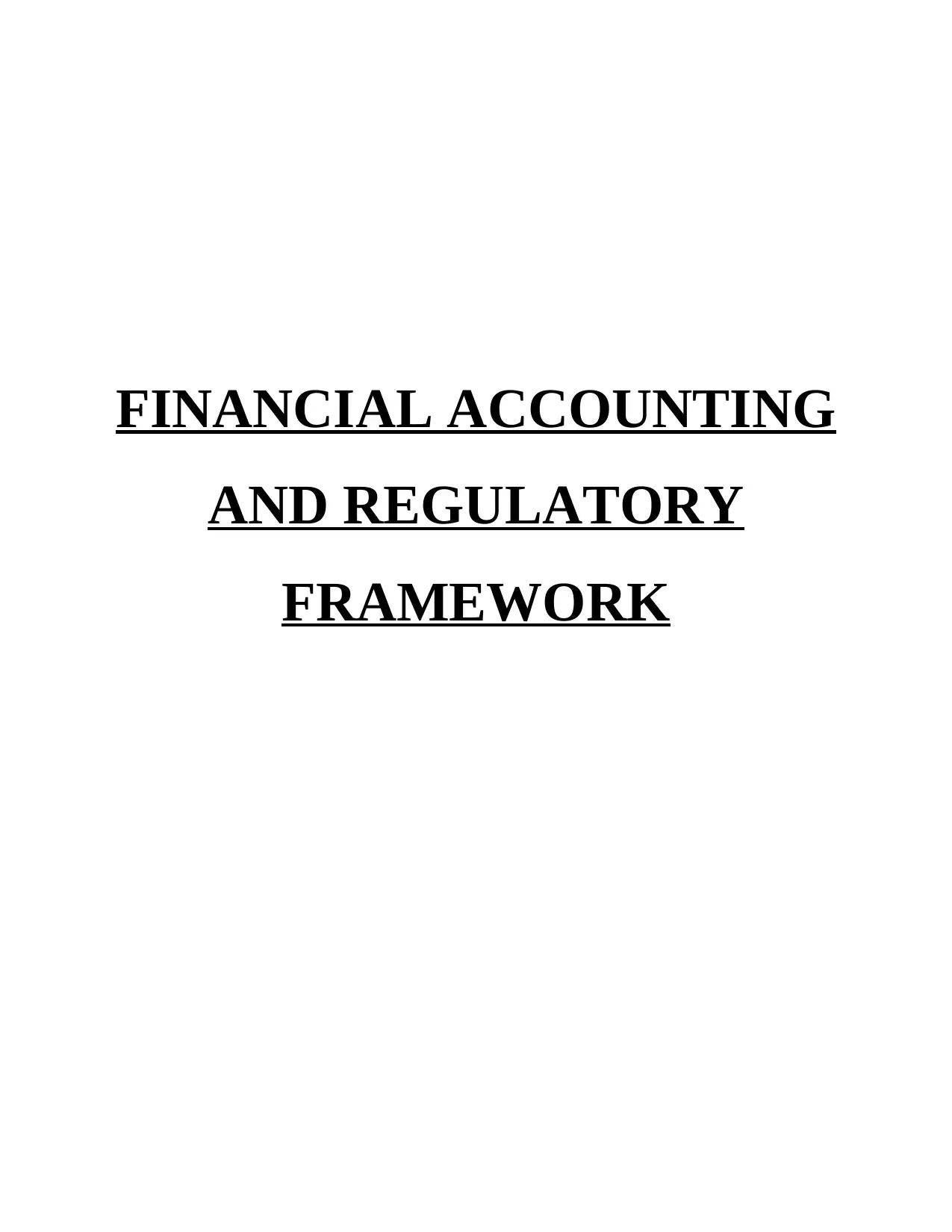
FINANCIAL ACCOUNTING
AND REGULATORY
FRAMEWORK
AND REGULATORY
FRAMEWORK
Paraphrase This Document
Need a fresh take? Get an instant paraphrase of this document with our AI Paraphraser

Table of Contents
MAIN BODY...................................................................................................................................3
REFERENCES................................................................................................................................1
MAIN BODY...................................................................................................................................3
REFERENCES................................................................................................................................1
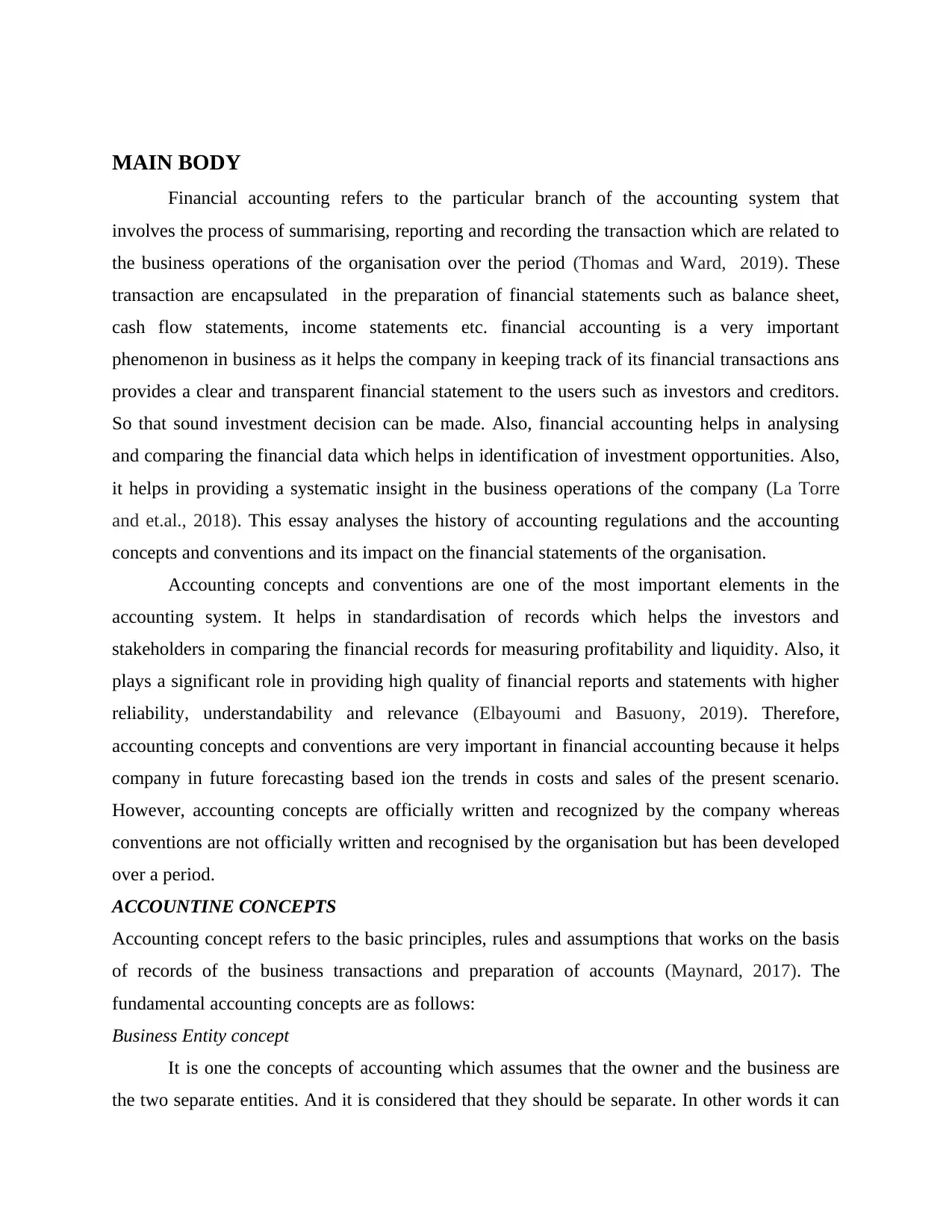
MAIN BODY
Financial accounting refers to the particular branch of the accounting system that
involves the process of summarising, reporting and recording the transaction which are related to
the business operations of the organisation over the period (Thomas and Ward, 2019). These
transaction are encapsulated in the preparation of financial statements such as balance sheet,
cash flow statements, income statements etc. financial accounting is a very important
phenomenon in business as it helps the company in keeping track of its financial transactions ans
provides a clear and transparent financial statement to the users such as investors and creditors.
So that sound investment decision can be made. Also, financial accounting helps in analysing
and comparing the financial data which helps in identification of investment opportunities. Also,
it helps in providing a systematic insight in the business operations of the company (La Torre
and et.al., 2018). This essay analyses the history of accounting regulations and the accounting
concepts and conventions and its impact on the financial statements of the organisation.
Accounting concepts and conventions are one of the most important elements in the
accounting system. It helps in standardisation of records which helps the investors and
stakeholders in comparing the financial records for measuring profitability and liquidity. Also, it
plays a significant role in providing high quality of financial reports and statements with higher
reliability, understandability and relevance (Elbayoumi and Basuony, 2019). Therefore,
accounting concepts and conventions are very important in financial accounting because it helps
company in future forecasting based ion the trends in costs and sales of the present scenario.
However, accounting concepts are officially written and recognized by the company whereas
conventions are not officially written and recognised by the organisation but has been developed
over a period.
ACCOUNTINE CONCEPTS
Accounting concept refers to the basic principles, rules and assumptions that works on the basis
of records of the business transactions and preparation of accounts (Maynard, 2017). The
fundamental accounting concepts are as follows:
Business Entity concept
It is one the concepts of accounting which assumes that the owner and the business are
the two separate entities. And it is considered that they should be separate. In other words it can
Financial accounting refers to the particular branch of the accounting system that
involves the process of summarising, reporting and recording the transaction which are related to
the business operations of the organisation over the period (Thomas and Ward, 2019). These
transaction are encapsulated in the preparation of financial statements such as balance sheet,
cash flow statements, income statements etc. financial accounting is a very important
phenomenon in business as it helps the company in keeping track of its financial transactions ans
provides a clear and transparent financial statement to the users such as investors and creditors.
So that sound investment decision can be made. Also, financial accounting helps in analysing
and comparing the financial data which helps in identification of investment opportunities. Also,
it helps in providing a systematic insight in the business operations of the company (La Torre
and et.al., 2018). This essay analyses the history of accounting regulations and the accounting
concepts and conventions and its impact on the financial statements of the organisation.
Accounting concepts and conventions are one of the most important elements in the
accounting system. It helps in standardisation of records which helps the investors and
stakeholders in comparing the financial records for measuring profitability and liquidity. Also, it
plays a significant role in providing high quality of financial reports and statements with higher
reliability, understandability and relevance (Elbayoumi and Basuony, 2019). Therefore,
accounting concepts and conventions are very important in financial accounting because it helps
company in future forecasting based ion the trends in costs and sales of the present scenario.
However, accounting concepts are officially written and recognized by the company whereas
conventions are not officially written and recognised by the organisation but has been developed
over a period.
ACCOUNTINE CONCEPTS
Accounting concept refers to the basic principles, rules and assumptions that works on the basis
of records of the business transactions and preparation of accounts (Maynard, 2017). The
fundamental accounting concepts are as follows:
Business Entity concept
It is one the concepts of accounting which assumes that the owner and the business are
the two separate entities. And it is considered that they should be separate. In other words it can
⊘ This is a preview!⊘
Do you want full access?
Subscribe today to unlock all pages.

Trusted by 1+ million students worldwide
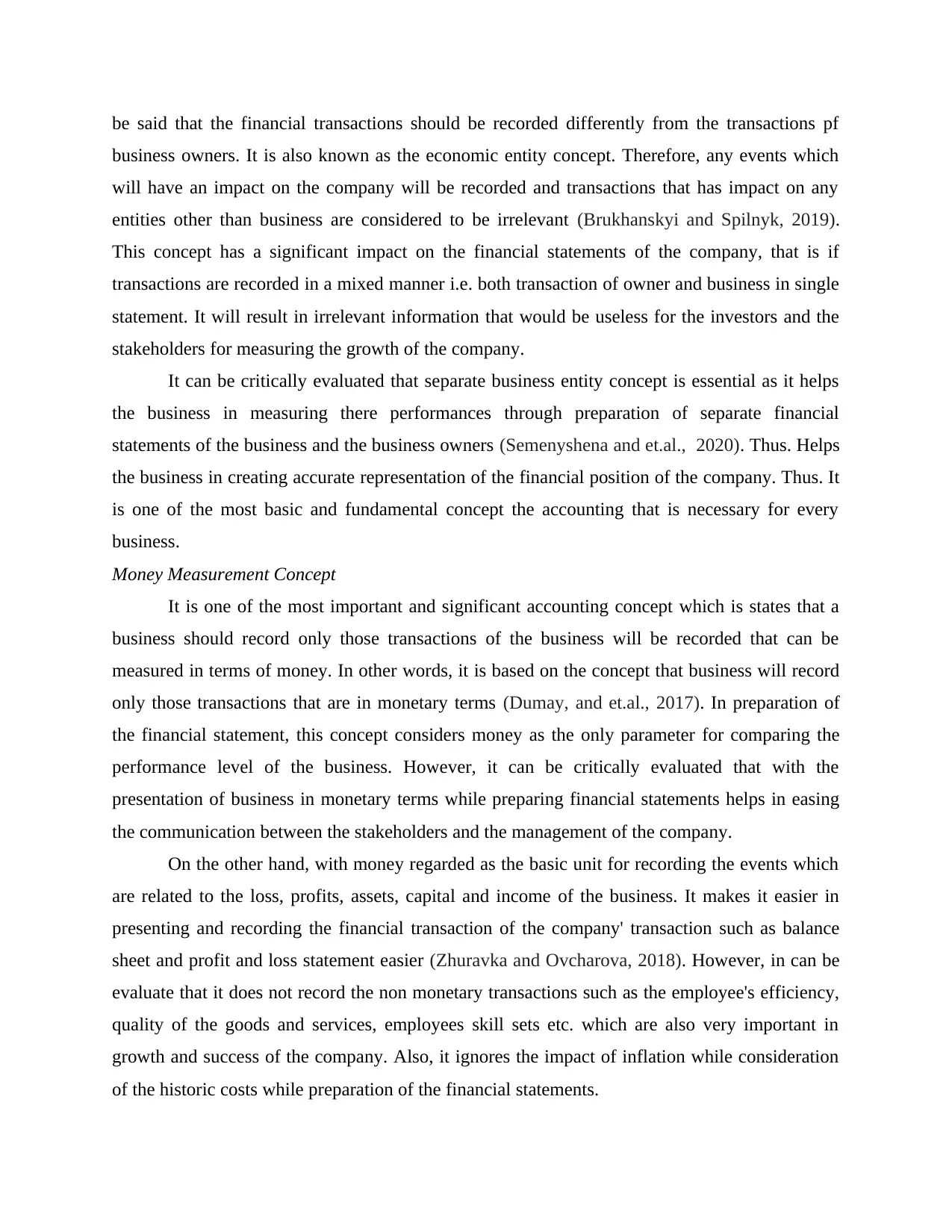
be said that the financial transactions should be recorded differently from the transactions pf
business owners. It is also known as the economic entity concept. Therefore, any events which
will have an impact on the company will be recorded and transactions that has impact on any
entities other than business are considered to be irrelevant (Brukhanskyi and Spilnyk, 2019).
This concept has a significant impact on the financial statements of the company, that is if
transactions are recorded in a mixed manner i.e. both transaction of owner and business in single
statement. It will result in irrelevant information that would be useless for the investors and the
stakeholders for measuring the growth of the company.
It can be critically evaluated that separate business entity concept is essential as it helps
the business in measuring there performances through preparation of separate financial
statements of the business and the business owners (Semenyshena and et.al., 2020). Thus. Helps
the business in creating accurate representation of the financial position of the company. Thus. It
is one of the most basic and fundamental concept the accounting that is necessary for every
business.
Money Measurement Concept
It is one of the most important and significant accounting concept which is states that a
business should record only those transactions of the business will be recorded that can be
measured in terms of money. In other words, it is based on the concept that business will record
only those transactions that are in monetary terms (Dumay, and et.al., 2017). In preparation of
the financial statement, this concept considers money as the only parameter for comparing the
performance level of the business. However, it can be critically evaluated that with the
presentation of business in monetary terms while preparing financial statements helps in easing
the communication between the stakeholders and the management of the company.
On the other hand, with money regarded as the basic unit for recording the events which
are related to the loss, profits, assets, capital and income of the business. It makes it easier in
presenting and recording the financial transaction of the company' transaction such as balance
sheet and profit and loss statement easier (Zhuravka and Ovcharova, 2018). However, in can be
evaluate that it does not record the non monetary transactions such as the employee's efficiency,
quality of the goods and services, employees skill sets etc. which are also very important in
growth and success of the company. Also, it ignores the impact of inflation while consideration
of the historic costs while preparation of the financial statements.
business owners. It is also known as the economic entity concept. Therefore, any events which
will have an impact on the company will be recorded and transactions that has impact on any
entities other than business are considered to be irrelevant (Brukhanskyi and Spilnyk, 2019).
This concept has a significant impact on the financial statements of the company, that is if
transactions are recorded in a mixed manner i.e. both transaction of owner and business in single
statement. It will result in irrelevant information that would be useless for the investors and the
stakeholders for measuring the growth of the company.
It can be critically evaluated that separate business entity concept is essential as it helps
the business in measuring there performances through preparation of separate financial
statements of the business and the business owners (Semenyshena and et.al., 2020). Thus. Helps
the business in creating accurate representation of the financial position of the company. Thus. It
is one of the most basic and fundamental concept the accounting that is necessary for every
business.
Money Measurement Concept
It is one of the most important and significant accounting concept which is states that a
business should record only those transactions of the business will be recorded that can be
measured in terms of money. In other words, it is based on the concept that business will record
only those transactions that are in monetary terms (Dumay, and et.al., 2017). In preparation of
the financial statement, this concept considers money as the only parameter for comparing the
performance level of the business. However, it can be critically evaluated that with the
presentation of business in monetary terms while preparing financial statements helps in easing
the communication between the stakeholders and the management of the company.
On the other hand, with money regarded as the basic unit for recording the events which
are related to the loss, profits, assets, capital and income of the business. It makes it easier in
presenting and recording the financial transaction of the company' transaction such as balance
sheet and profit and loss statement easier (Zhuravka and Ovcharova, 2018). However, in can be
evaluate that it does not record the non monetary transactions such as the employee's efficiency,
quality of the goods and services, employees skill sets etc. which are also very important in
growth and success of the company. Also, it ignores the impact of inflation while consideration
of the historic costs while preparation of the financial statements.
Paraphrase This Document
Need a fresh take? Get an instant paraphrase of this document with our AI Paraphraser
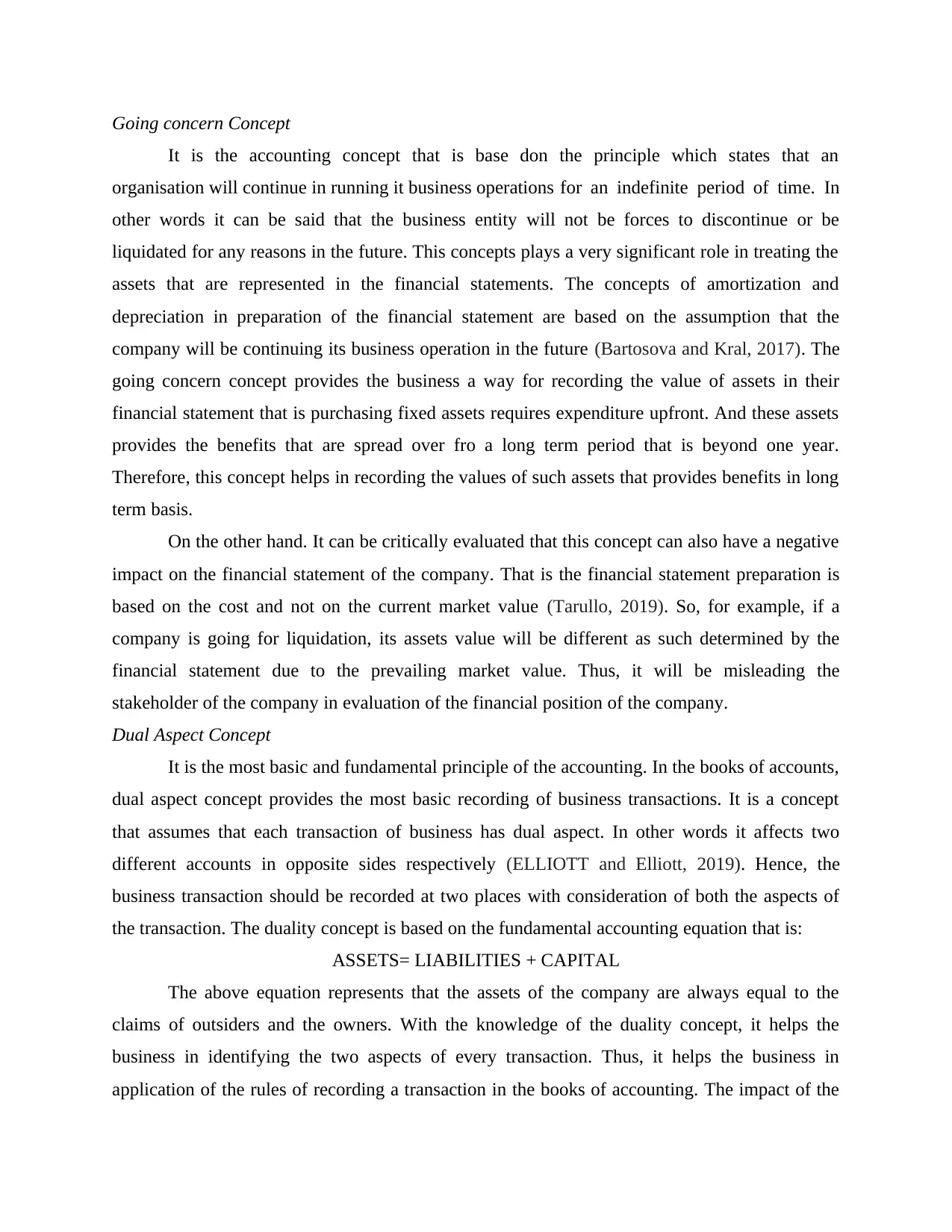
Going concern Concept
It is the accounting concept that is base don the principle which states that an
organisation will continue in running it business operations for an indefinite period of time. In
other words it can be said that the business entity will not be forces to discontinue or be
liquidated for any reasons in the future. This concepts plays a very significant role in treating the
assets that are represented in the financial statements. The concepts of amortization and
depreciation in preparation of the financial statement are based on the assumption that the
company will be continuing its business operation in the future (Bartosova and Kral, 2017). The
going concern concept provides the business a way for recording the value of assets in their
financial statement that is purchasing fixed assets requires expenditure upfront. And these assets
provides the benefits that are spread over fro a long term period that is beyond one year.
Therefore, this concept helps in recording the values of such assets that provides benefits in long
term basis.
On the other hand. It can be critically evaluated that this concept can also have a negative
impact on the financial statement of the company. That is the financial statement preparation is
based on the cost and not on the current market value (Tarullo, 2019). So, for example, if a
company is going for liquidation, its assets value will be different as such determined by the
financial statement due to the prevailing market value. Thus, it will be misleading the
stakeholder of the company in evaluation of the financial position of the company.
Dual Aspect Concept
It is the most basic and fundamental principle of the accounting. In the books of accounts,
dual aspect concept provides the most basic recording of business transactions. It is a concept
that assumes that each transaction of business has dual aspect. In other words it affects two
different accounts in opposite sides respectively (ELLIOTT and Elliott, 2019). Hence, the
business transaction should be recorded at two places with consideration of both the aspects of
the transaction. The duality concept is based on the fundamental accounting equation that is:
ASSETS= LIABILITIES + CAPITAL
The above equation represents that the assets of the company are always equal to the
claims of outsiders and the owners. With the knowledge of the duality concept, it helps the
business in identifying the two aspects of every transaction. Thus, it helps the business in
application of the rules of recording a transaction in the books of accounting. The impact of the
It is the accounting concept that is base don the principle which states that an
organisation will continue in running it business operations for an indefinite period of time. In
other words it can be said that the business entity will not be forces to discontinue or be
liquidated for any reasons in the future. This concepts plays a very significant role in treating the
assets that are represented in the financial statements. The concepts of amortization and
depreciation in preparation of the financial statement are based on the assumption that the
company will be continuing its business operation in the future (Bartosova and Kral, 2017). The
going concern concept provides the business a way for recording the value of assets in their
financial statement that is purchasing fixed assets requires expenditure upfront. And these assets
provides the benefits that are spread over fro a long term period that is beyond one year.
Therefore, this concept helps in recording the values of such assets that provides benefits in long
term basis.
On the other hand. It can be critically evaluated that this concept can also have a negative
impact on the financial statement of the company. That is the financial statement preparation is
based on the cost and not on the current market value (Tarullo, 2019). So, for example, if a
company is going for liquidation, its assets value will be different as such determined by the
financial statement due to the prevailing market value. Thus, it will be misleading the
stakeholder of the company in evaluation of the financial position of the company.
Dual Aspect Concept
It is the most basic and fundamental principle of the accounting. In the books of accounts,
dual aspect concept provides the most basic recording of business transactions. It is a concept
that assumes that each transaction of business has dual aspect. In other words it affects two
different accounts in opposite sides respectively (ELLIOTT and Elliott, 2019). Hence, the
business transaction should be recorded at two places with consideration of both the aspects of
the transaction. The duality concept is based on the fundamental accounting equation that is:
ASSETS= LIABILITIES + CAPITAL
The above equation represents that the assets of the company are always equal to the
claims of outsiders and the owners. With the knowledge of the duality concept, it helps the
business in identifying the two aspects of every transaction. Thus, it helps the business in
application of the rules of recording a transaction in the books of accounting. The impact of the
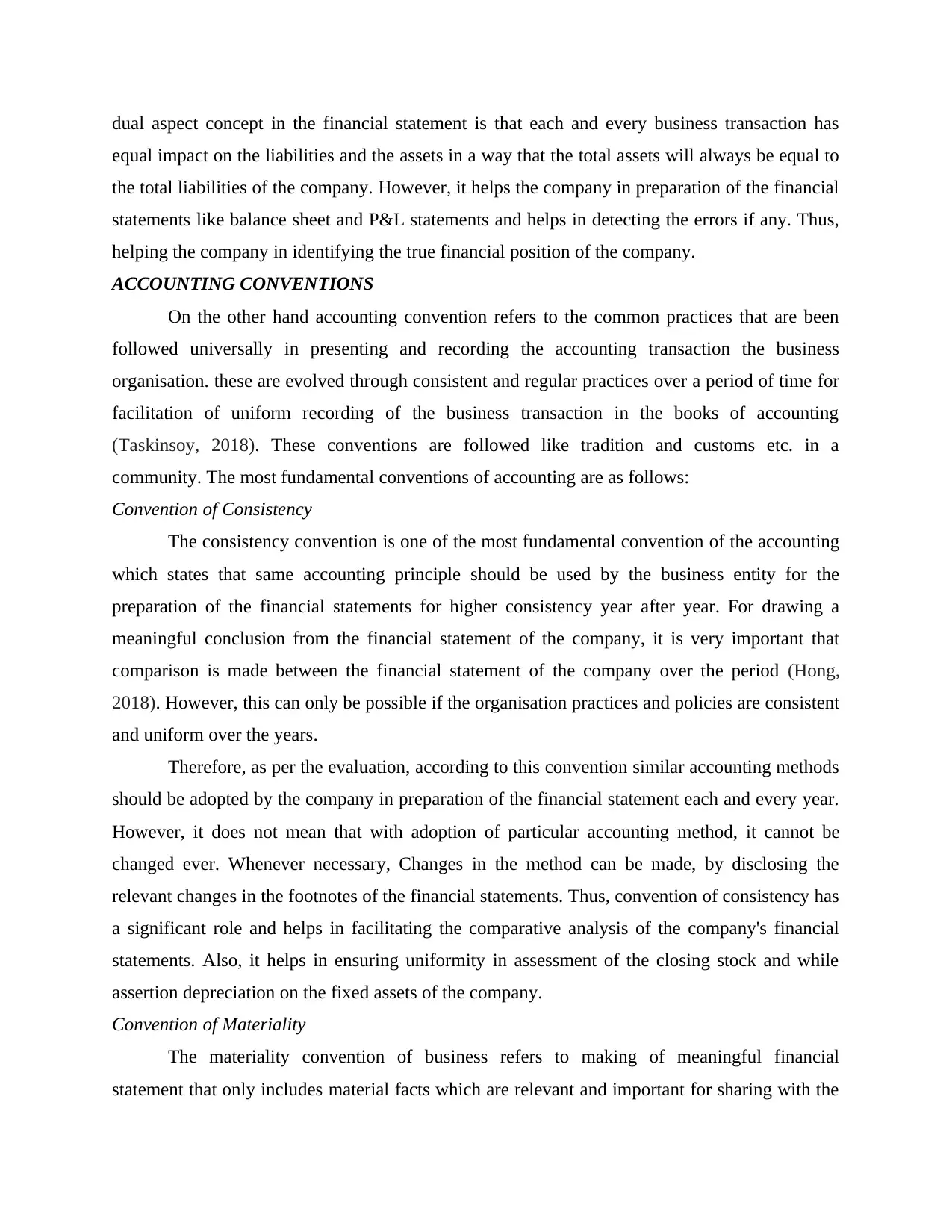
dual aspect concept in the financial statement is that each and every business transaction has
equal impact on the liabilities and the assets in a way that the total assets will always be equal to
the total liabilities of the company. However, it helps the company in preparation of the financial
statements like balance sheet and P&L statements and helps in detecting the errors if any. Thus,
helping the company in identifying the true financial position of the company.
ACCOUNTING CONVENTIONS
On the other hand accounting convention refers to the common practices that are been
followed universally in presenting and recording the accounting transaction the business
organisation. these are evolved through consistent and regular practices over a period of time for
facilitation of uniform recording of the business transaction in the books of accounting
(Taskinsoy, 2018). These conventions are followed like tradition and customs etc. in a
community. The most fundamental conventions of accounting are as follows:
Convention of Consistency
The consistency convention is one of the most fundamental convention of the accounting
which states that same accounting principle should be used by the business entity for the
preparation of the financial statements for higher consistency year after year. For drawing a
meaningful conclusion from the financial statement of the company, it is very important that
comparison is made between the financial statement of the company over the period (Hong,
2018). However, this can only be possible if the organisation practices and policies are consistent
and uniform over the years.
Therefore, as per the evaluation, according to this convention similar accounting methods
should be adopted by the company in preparation of the financial statement each and every year.
However, it does not mean that with adoption of particular accounting method, it cannot be
changed ever. Whenever necessary, Changes in the method can be made, by disclosing the
relevant changes in the footnotes of the financial statements. Thus, convention of consistency has
a significant role and helps in facilitating the comparative analysis of the company's financial
statements. Also, it helps in ensuring uniformity in assessment of the closing stock and while
assertion depreciation on the fixed assets of the company.
Convention of Materiality
The materiality convention of business refers to making of meaningful financial
statement that only includes material facts which are relevant and important for sharing with the
equal impact on the liabilities and the assets in a way that the total assets will always be equal to
the total liabilities of the company. However, it helps the company in preparation of the financial
statements like balance sheet and P&L statements and helps in detecting the errors if any. Thus,
helping the company in identifying the true financial position of the company.
ACCOUNTING CONVENTIONS
On the other hand accounting convention refers to the common practices that are been
followed universally in presenting and recording the accounting transaction the business
organisation. these are evolved through consistent and regular practices over a period of time for
facilitation of uniform recording of the business transaction in the books of accounting
(Taskinsoy, 2018). These conventions are followed like tradition and customs etc. in a
community. The most fundamental conventions of accounting are as follows:
Convention of Consistency
The consistency convention is one of the most fundamental convention of the accounting
which states that same accounting principle should be used by the business entity for the
preparation of the financial statements for higher consistency year after year. For drawing a
meaningful conclusion from the financial statement of the company, it is very important that
comparison is made between the financial statement of the company over the period (Hong,
2018). However, this can only be possible if the organisation practices and policies are consistent
and uniform over the years.
Therefore, as per the evaluation, according to this convention similar accounting methods
should be adopted by the company in preparation of the financial statement each and every year.
However, it does not mean that with adoption of particular accounting method, it cannot be
changed ever. Whenever necessary, Changes in the method can be made, by disclosing the
relevant changes in the footnotes of the financial statements. Thus, convention of consistency has
a significant role and helps in facilitating the comparative analysis of the company's financial
statements. Also, it helps in ensuring uniformity in assessment of the closing stock and while
assertion depreciation on the fixed assets of the company.
Convention of Materiality
The materiality convention of business refers to making of meaningful financial
statement that only includes material facts which are relevant and important for sharing with the
⊘ This is a preview!⊘
Do you want full access?
Subscribe today to unlock all pages.

Trusted by 1+ million students worldwide
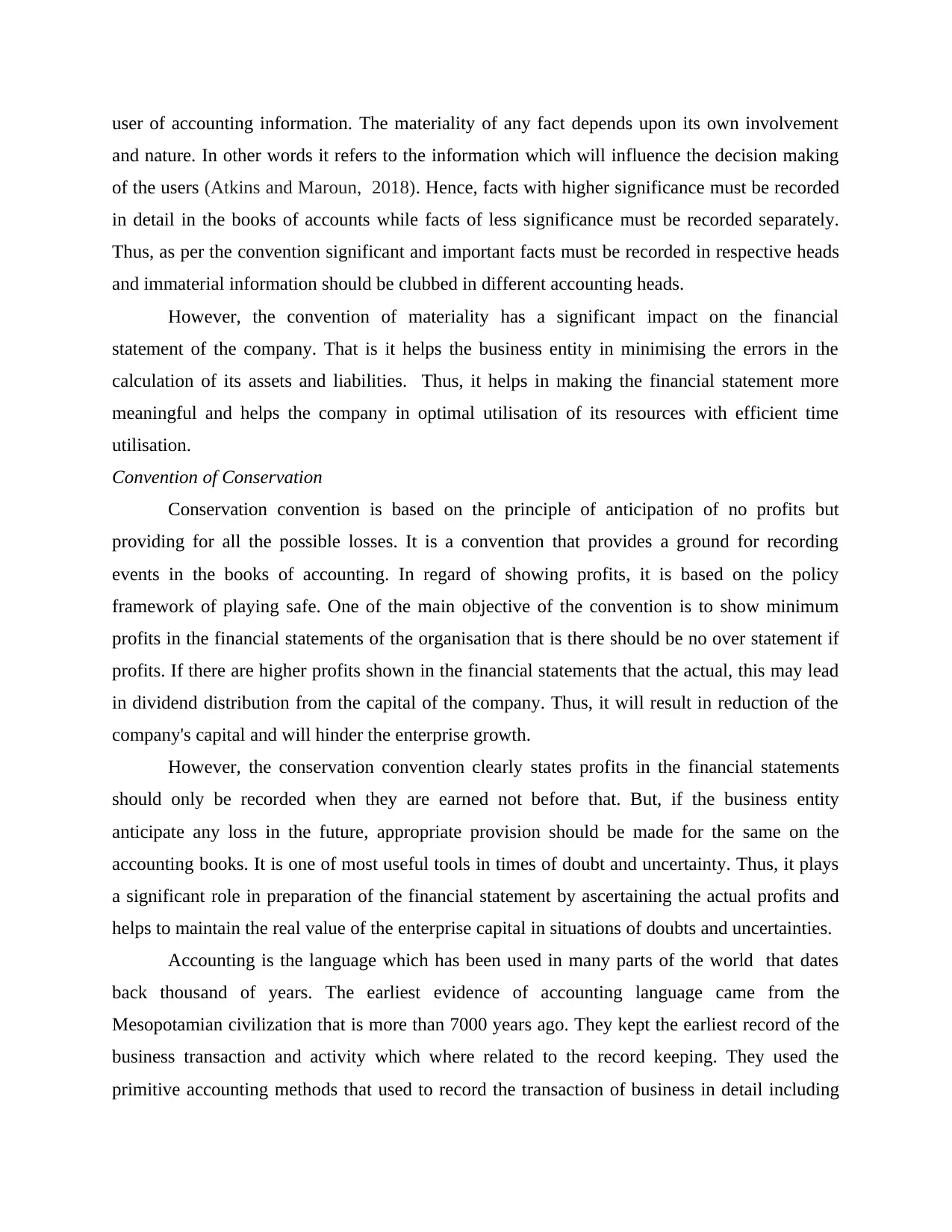
user of accounting information. The materiality of any fact depends upon its own involvement
and nature. In other words it refers to the information which will influence the decision making
of the users (Atkins and Maroun, 2018). Hence, facts with higher significance must be recorded
in detail in the books of accounts while facts of less significance must be recorded separately.
Thus, as per the convention significant and important facts must be recorded in respective heads
and immaterial information should be clubbed in different accounting heads.
However, the convention of materiality has a significant impact on the financial
statement of the company. That is it helps the business entity in minimising the errors in the
calculation of its assets and liabilities. Thus, it helps in making the financial statement more
meaningful and helps the company in optimal utilisation of its resources with efficient time
utilisation.
Convention of Conservation
Conservation convention is based on the principle of anticipation of no profits but
providing for all the possible losses. It is a convention that provides a ground for recording
events in the books of accounting. In regard of showing profits, it is based on the policy
framework of playing safe. One of the main objective of the convention is to show minimum
profits in the financial statements of the organisation that is there should be no over statement if
profits. If there are higher profits shown in the financial statements that the actual, this may lead
in dividend distribution from the capital of the company. Thus, it will result in reduction of the
company's capital and will hinder the enterprise growth.
However, the conservation convention clearly states profits in the financial statements
should only be recorded when they are earned not before that. But, if the business entity
anticipate any loss in the future, appropriate provision should be made for the same on the
accounting books. It is one of most useful tools in times of doubt and uncertainty. Thus, it plays
a significant role in preparation of the financial statement by ascertaining the actual profits and
helps to maintain the real value of the enterprise capital in situations of doubts and uncertainties.
Accounting is the language which has been used in many parts of the world that dates
back thousand of years. The earliest evidence of accounting language came from the
Mesopotamian civilization that is more than 7000 years ago. They kept the earliest record of the
business transaction and activity which where related to the record keeping. They used the
primitive accounting methods that used to record the transaction of business in detail including
and nature. In other words it refers to the information which will influence the decision making
of the users (Atkins and Maroun, 2018). Hence, facts with higher significance must be recorded
in detail in the books of accounts while facts of less significance must be recorded separately.
Thus, as per the convention significant and important facts must be recorded in respective heads
and immaterial information should be clubbed in different accounting heads.
However, the convention of materiality has a significant impact on the financial
statement of the company. That is it helps the business entity in minimising the errors in the
calculation of its assets and liabilities. Thus, it helps in making the financial statement more
meaningful and helps the company in optimal utilisation of its resources with efficient time
utilisation.
Convention of Conservation
Conservation convention is based on the principle of anticipation of no profits but
providing for all the possible losses. It is a convention that provides a ground for recording
events in the books of accounting. In regard of showing profits, it is based on the policy
framework of playing safe. One of the main objective of the convention is to show minimum
profits in the financial statements of the organisation that is there should be no over statement if
profits. If there are higher profits shown in the financial statements that the actual, this may lead
in dividend distribution from the capital of the company. Thus, it will result in reduction of the
company's capital and will hinder the enterprise growth.
However, the conservation convention clearly states profits in the financial statements
should only be recorded when they are earned not before that. But, if the business entity
anticipate any loss in the future, appropriate provision should be made for the same on the
accounting books. It is one of most useful tools in times of doubt and uncertainty. Thus, it plays
a significant role in preparation of the financial statement by ascertaining the actual profits and
helps to maintain the real value of the enterprise capital in situations of doubts and uncertainties.
Accounting is the language which has been used in many parts of the world that dates
back thousand of years. The earliest evidence of accounting language came from the
Mesopotamian civilization that is more than 7000 years ago. They kept the earliest record of the
business transaction and activity which where related to the record keeping. They used the
primitive accounting methods that used to record the transaction of business in detail including
Paraphrase This Document
Need a fresh take? Get an instant paraphrase of this document with our AI Paraphraser
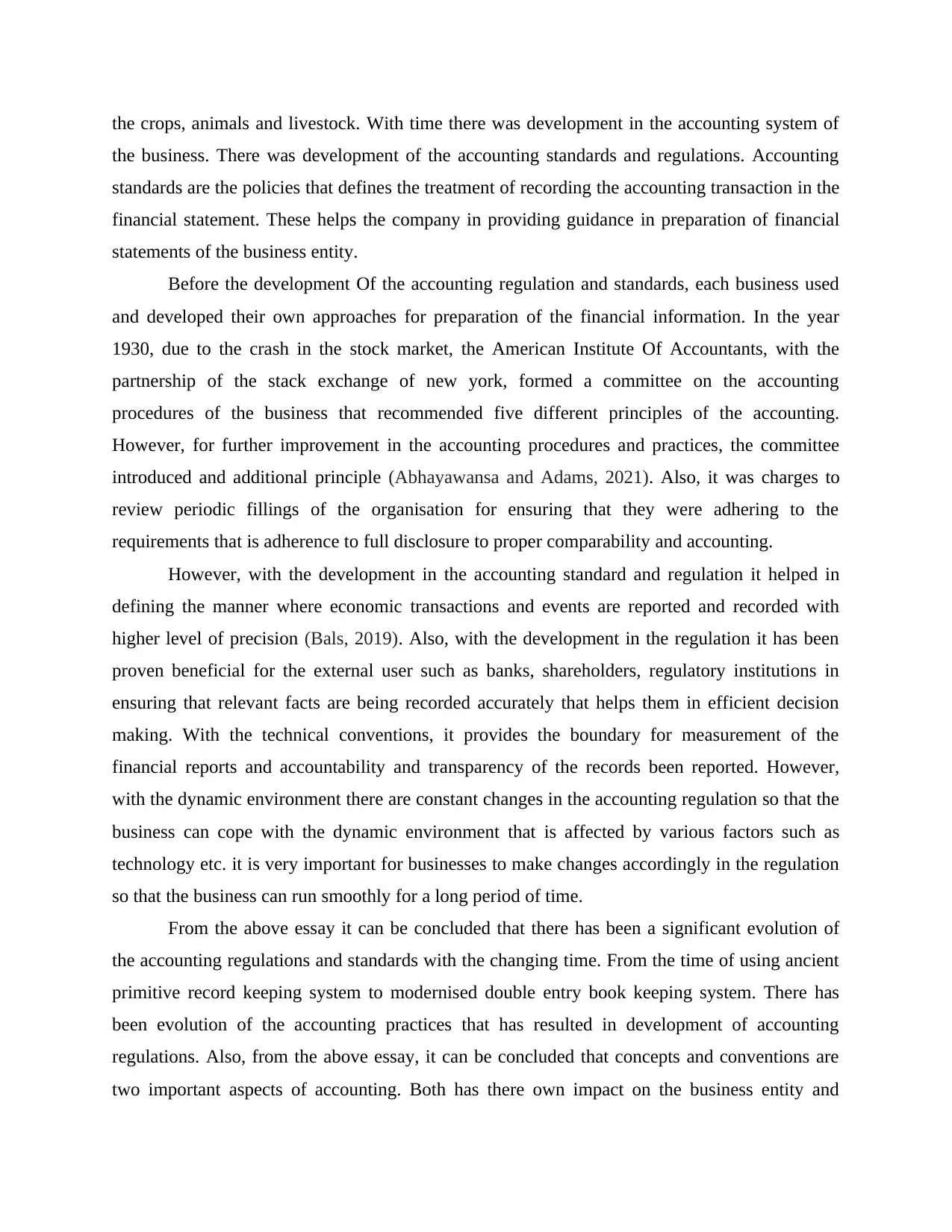
the crops, animals and livestock. With time there was development in the accounting system of
the business. There was development of the accounting standards and regulations. Accounting
standards are the policies that defines the treatment of recording the accounting transaction in the
financial statement. These helps the company in providing guidance in preparation of financial
statements of the business entity.
Before the development Of the accounting regulation and standards, each business used
and developed their own approaches for preparation of the financial information. In the year
1930, due to the crash in the stock market, the American Institute Of Accountants, with the
partnership of the stack exchange of new york, formed a committee on the accounting
procedures of the business that recommended five different principles of the accounting.
However, for further improvement in the accounting procedures and practices, the committee
introduced and additional principle (Abhayawansa and Adams, 2021). Also, it was charges to
review periodic fillings of the organisation for ensuring that they were adhering to the
requirements that is adherence to full disclosure to proper comparability and accounting.
However, with the development in the accounting standard and regulation it helped in
defining the manner where economic transactions and events are reported and recorded with
higher level of precision (Bals, 2019). Also, with the development in the regulation it has been
proven beneficial for the external user such as banks, shareholders, regulatory institutions in
ensuring that relevant facts are being recorded accurately that helps them in efficient decision
making. With the technical conventions, it provides the boundary for measurement of the
financial reports and accountability and transparency of the records been reported. However,
with the dynamic environment there are constant changes in the accounting regulation so that the
business can cope with the dynamic environment that is affected by various factors such as
technology etc. it is very important for businesses to make changes accordingly in the regulation
so that the business can run smoothly for a long period of time.
From the above essay it can be concluded that there has been a significant evolution of
the accounting regulations and standards with the changing time. From the time of using ancient
primitive record keeping system to modernised double entry book keeping system. There has
been evolution of the accounting practices that has resulted in development of accounting
regulations. Also, from the above essay, it can be concluded that concepts and conventions are
two important aspects of accounting. Both has there own impact on the business entity and
the business. There was development of the accounting standards and regulations. Accounting
standards are the policies that defines the treatment of recording the accounting transaction in the
financial statement. These helps the company in providing guidance in preparation of financial
statements of the business entity.
Before the development Of the accounting regulation and standards, each business used
and developed their own approaches for preparation of the financial information. In the year
1930, due to the crash in the stock market, the American Institute Of Accountants, with the
partnership of the stack exchange of new york, formed a committee on the accounting
procedures of the business that recommended five different principles of the accounting.
However, for further improvement in the accounting procedures and practices, the committee
introduced and additional principle (Abhayawansa and Adams, 2021). Also, it was charges to
review periodic fillings of the organisation for ensuring that they were adhering to the
requirements that is adherence to full disclosure to proper comparability and accounting.
However, with the development in the accounting standard and regulation it helped in
defining the manner where economic transactions and events are reported and recorded with
higher level of precision (Bals, 2019). Also, with the development in the regulation it has been
proven beneficial for the external user such as banks, shareholders, regulatory institutions in
ensuring that relevant facts are being recorded accurately that helps them in efficient decision
making. With the technical conventions, it provides the boundary for measurement of the
financial reports and accountability and transparency of the records been reported. However,
with the dynamic environment there are constant changes in the accounting regulation so that the
business can cope with the dynamic environment that is affected by various factors such as
technology etc. it is very important for businesses to make changes accordingly in the regulation
so that the business can run smoothly for a long period of time.
From the above essay it can be concluded that there has been a significant evolution of
the accounting regulations and standards with the changing time. From the time of using ancient
primitive record keeping system to modernised double entry book keeping system. There has
been evolution of the accounting practices that has resulted in development of accounting
regulations. Also, from the above essay, it can be concluded that concepts and conventions are
two important aspects of accounting. Both has there own impact on the business entity and
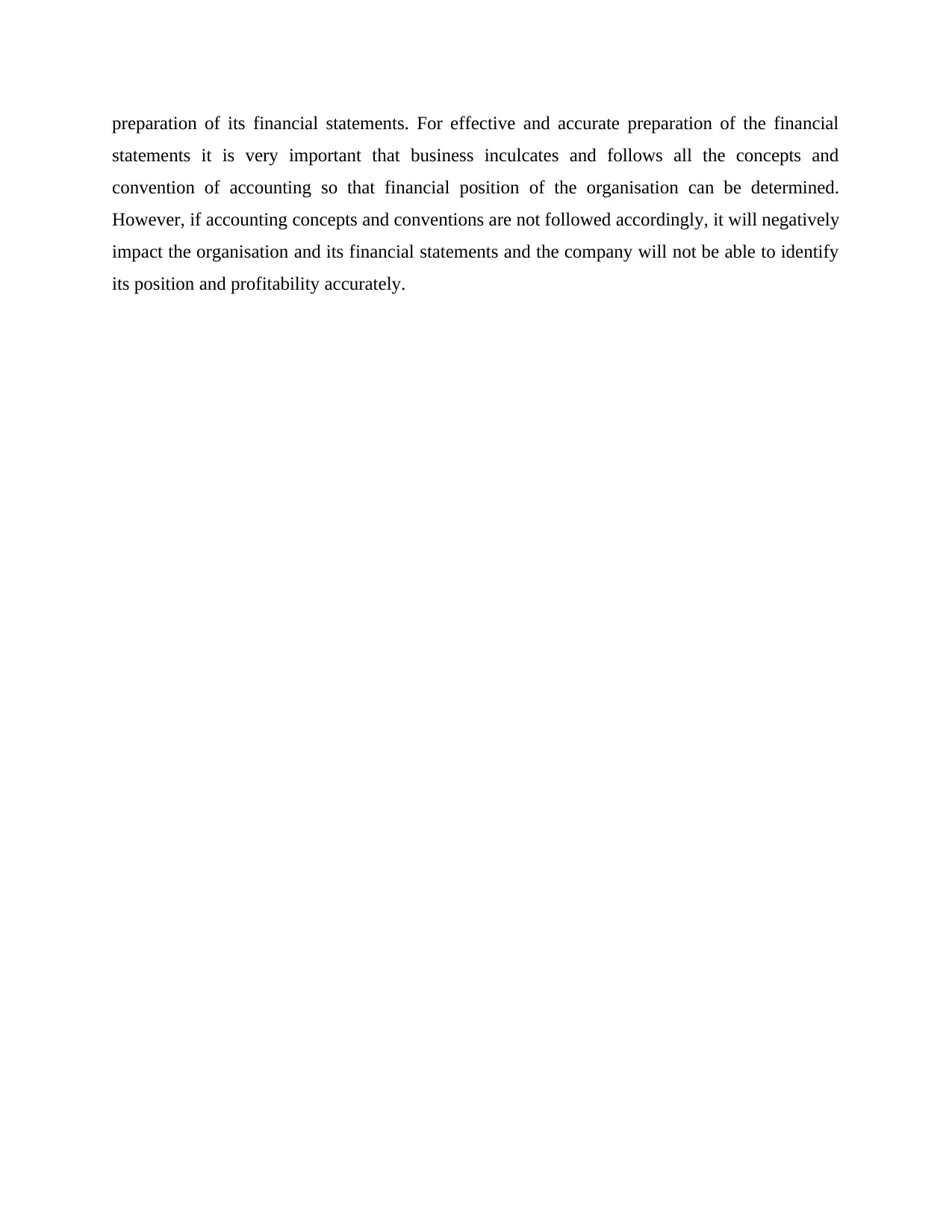
preparation of its financial statements. For effective and accurate preparation of the financial
statements it is very important that business inculcates and follows all the concepts and
convention of accounting so that financial position of the organisation can be determined.
However, if accounting concepts and conventions are not followed accordingly, it will negatively
impact the organisation and its financial statements and the company will not be able to identify
its position and profitability accurately.
statements it is very important that business inculcates and follows all the concepts and
convention of accounting so that financial position of the organisation can be determined.
However, if accounting concepts and conventions are not followed accordingly, it will negatively
impact the organisation and its financial statements and the company will not be able to identify
its position and profitability accurately.
⊘ This is a preview!⊘
Do you want full access?
Subscribe today to unlock all pages.

Trusted by 1+ million students worldwide
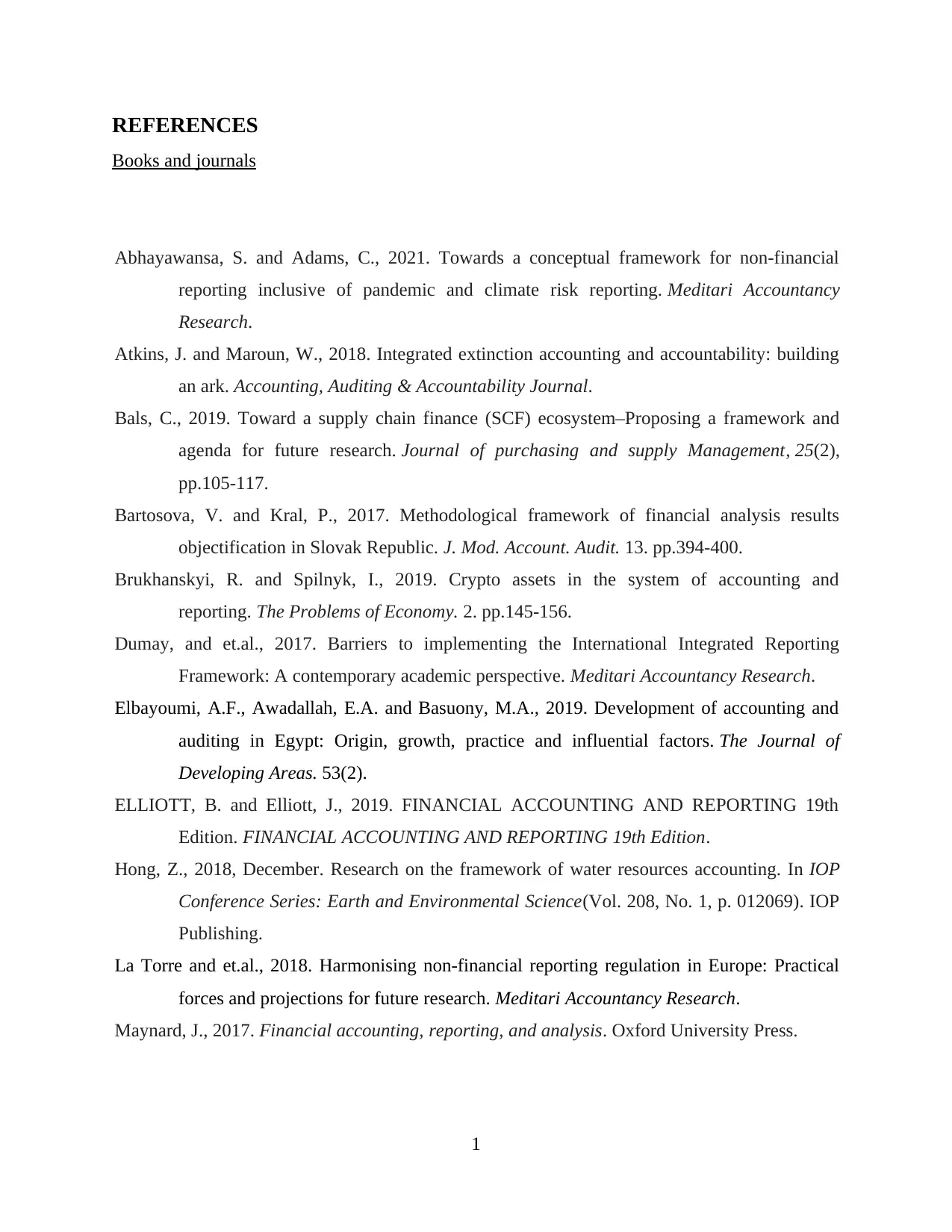
REFERENCES
Books and journals
Abhayawansa, S. and Adams, C., 2021. Towards a conceptual framework for non-financial
reporting inclusive of pandemic and climate risk reporting. Meditari Accountancy
Research.
Atkins, J. and Maroun, W., 2018. Integrated extinction accounting and accountability: building
an ark. Accounting, Auditing & Accountability Journal.
Bals, C., 2019. Toward a supply chain finance (SCF) ecosystem–Proposing a framework and
agenda for future research. Journal of purchasing and supply Management, 25(2),
pp.105-117.
Bartosova, V. and Kral, P., 2017. Methodological framework of financial analysis results
objectification in Slovak Republic. J. Mod. Account. Audit. 13. pp.394-400.
Brukhanskyi, R. and Spilnyk, I., 2019. Crypto assets in the system of accounting and
reporting. The Problems of Economy. 2. pp.145-156.
Dumay, and et.al., 2017. Barriers to implementing the International Integrated Reporting
Framework: A contemporary academic perspective. Meditari Accountancy Research.
Elbayoumi, A.F., Awadallah, E.A. and Basuony, M.A., 2019. Development of accounting and
auditing in Egypt: Origin, growth, practice and influential factors. The Journal of
Developing Areas. 53(2).
ELLIOTT, B. and Elliott, J., 2019. FINANCIAL ACCOUNTING AND REPORTING 19th
Edition. FINANCIAL ACCOUNTING AND REPORTING 19th Edition.
Hong, Z., 2018, December. Research on the framework of water resources accounting. In IOP
Conference Series: Earth and Environmental Science(Vol. 208, No. 1, p. 012069). IOP
Publishing.
La Torre and et.al., 2018. Harmonising non-financial reporting regulation in Europe: Practical
forces and projections for future research. Meditari Accountancy Research.
Maynard, J., 2017. Financial accounting, reporting, and analysis. Oxford University Press.
1
Books and journals
Abhayawansa, S. and Adams, C., 2021. Towards a conceptual framework for non-financial
reporting inclusive of pandemic and climate risk reporting. Meditari Accountancy
Research.
Atkins, J. and Maroun, W., 2018. Integrated extinction accounting and accountability: building
an ark. Accounting, Auditing & Accountability Journal.
Bals, C., 2019. Toward a supply chain finance (SCF) ecosystem–Proposing a framework and
agenda for future research. Journal of purchasing and supply Management, 25(2),
pp.105-117.
Bartosova, V. and Kral, P., 2017. Methodological framework of financial analysis results
objectification in Slovak Republic. J. Mod. Account. Audit. 13. pp.394-400.
Brukhanskyi, R. and Spilnyk, I., 2019. Crypto assets in the system of accounting and
reporting. The Problems of Economy. 2. pp.145-156.
Dumay, and et.al., 2017. Barriers to implementing the International Integrated Reporting
Framework: A contemporary academic perspective. Meditari Accountancy Research.
Elbayoumi, A.F., Awadallah, E.A. and Basuony, M.A., 2019. Development of accounting and
auditing in Egypt: Origin, growth, practice and influential factors. The Journal of
Developing Areas. 53(2).
ELLIOTT, B. and Elliott, J., 2019. FINANCIAL ACCOUNTING AND REPORTING 19th
Edition. FINANCIAL ACCOUNTING AND REPORTING 19th Edition.
Hong, Z., 2018, December. Research on the framework of water resources accounting. In IOP
Conference Series: Earth and Environmental Science(Vol. 208, No. 1, p. 012069). IOP
Publishing.
La Torre and et.al., 2018. Harmonising non-financial reporting regulation in Europe: Practical
forces and projections for future research. Meditari Accountancy Research.
Maynard, J., 2017. Financial accounting, reporting, and analysis. Oxford University Press.
1
Paraphrase This Document
Need a fresh take? Get an instant paraphrase of this document with our AI Paraphraser
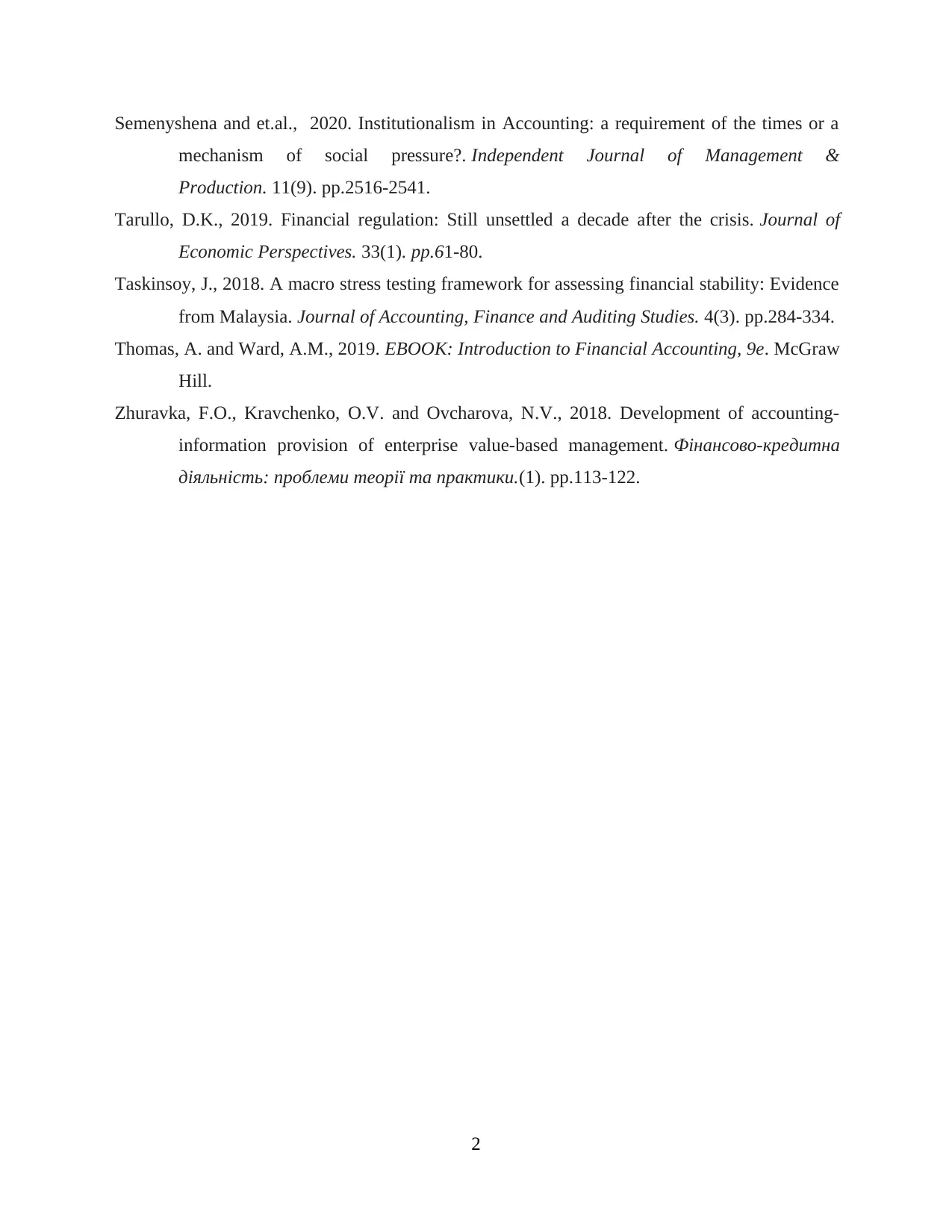
Semenyshena and et.al., 2020. Institutionalism in Accounting: a requirement of the times or a
mechanism of social pressure?. Independent Journal of Management &
Production. 11(9). pp.2516-2541.
Tarullo, D.K., 2019. Financial regulation: Still unsettled a decade after the crisis. Journal of
Economic Perspectives. 33(1). pp.61-80.
Taskinsoy, J., 2018. A macro stress testing framework for assessing financial stability: Evidence
from Malaysia. Journal of Accounting, Finance and Auditing Studies. 4(3). pp.284-334.
Thomas, A. and Ward, A.M., 2019. EBOOK: Introduction to Financial Accounting, 9e. McGraw
Hill.
Zhuravka, F.O., Kravchenko, O.V. and Ovcharova, N.V., 2018. Development of accounting-
information provision of enterprise value-based management. Фінансово-кредитна
діяльність: проблеми теорії та практики.(1). pp.113-122.
2
mechanism of social pressure?. Independent Journal of Management &
Production. 11(9). pp.2516-2541.
Tarullo, D.K., 2019. Financial regulation: Still unsettled a decade after the crisis. Journal of
Economic Perspectives. 33(1). pp.61-80.
Taskinsoy, J., 2018. A macro stress testing framework for assessing financial stability: Evidence
from Malaysia. Journal of Accounting, Finance and Auditing Studies. 4(3). pp.284-334.
Thomas, A. and Ward, A.M., 2019. EBOOK: Introduction to Financial Accounting, 9e. McGraw
Hill.
Zhuravka, F.O., Kravchenko, O.V. and Ovcharova, N.V., 2018. Development of accounting-
information provision of enterprise value-based management. Фінансово-кредитна
діяльність: проблеми теорії та практики.(1). pp.113-122.
2
1 out of 11
Related Documents
Your All-in-One AI-Powered Toolkit for Academic Success.
+13062052269
info@desklib.com
Available 24*7 on WhatsApp / Email
![[object Object]](/_next/static/media/star-bottom.7253800d.svg)
Unlock your academic potential
Copyright © 2020–2026 A2Z Services. All Rights Reserved. Developed and managed by ZUCOL.



